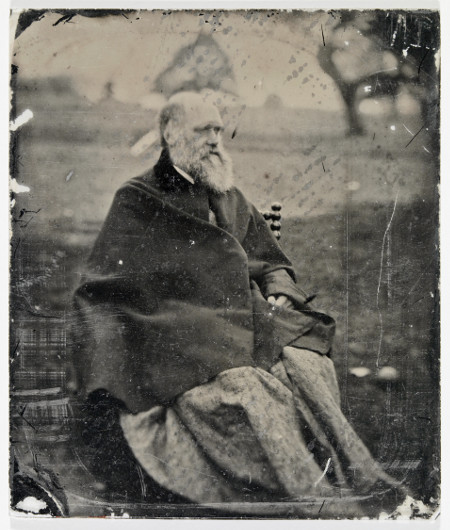On Feb. 12 we celebrated Charles Darwin's 206th birthday. (Fig. 1 shows Darwin late in life.) This calls for at least a brief essay, to remind ourselves of Darwin's remarkable achievement.
Figure 1. Darwin in his old age (reproduced by kind permission of the Syndics of Cambridge University Library).
Evolutionary biologist Ernst Mayr wrote once that Darwin's theory of evolution "caused a greater upheaval in man's thinking than any other scientific advance since the rebirth of science in the Renaissance."
Indeed, together with the Copernican revolution, the Darwinian revolution basically demolished the human anthropocentric view of the universe. The impact of the Darwinian revolution was and still is felt far beyond the boundaries of science.
But Darwin's theory did much more than that. By boldly stating that species are not eternal and immutable, Darwin introduced the concept of an evolving (rather than static) world. This fundamental idea was later expanded, and its adoption encompasses everything from the Earth to the stars to galaxies to the universe as a whole. Even though the laws of nature (as far as we can tell) stay unchanged, everything within the cosmos is evolving.
Another major consequence of the new Darwinian perspective has been the complete denial of any cosmic teleology. Evolution by natural selection has no long-term "strategic plan" or ultimate goal. Rather than striving toward some perfection, natural selection simply tinkers by elimination of the individuals with characteristics that are less adapted to the particular conditions of their environment.
If not for the fact that Darwin's theory had meaningful implications for the nature and status of humans, I doubt that his theory would have caused quite the same outcry.
In fact, Darwin himself chose to dodge the issue of humans in the first edition of On the Origin of Species, by only cryptically hinting that "In the distant future ... light will be thrown on the origin of man and his history." Only in his later book, The Descent of Man, did Darwin explicitly explain that humans are nothing special but just another product of a continuous evolution. The seeds of this idea, however, had already been planted in On the Origin of Species: "Probably all the organic beings which have ever lived on the earth have descended from some one primordial form."
The history of science since Darwin has shown us time and again that from a purely physical perspective, humans are but tiny specks of dust in the grand universal scheme. Even the stuff we're made of -- ordinary (baryonic) matter -- constitutes less than 5 percent of the cosmic energy budget.
Darwin beautifully reminded us to be humble at the end of The Origin:
We must ... acknowledge, as it seems to me, that man with all of his noble qualities, which sympathy which feels for the most debased, with benevolence which extends not only to other man but to the humblest living creature, with his god-like intellect which has penetrated into the movements and constitution of the solar system -- with all these exalted powers -- Man still bears in his bodily frame the indelible stamp of his lowly origin.
